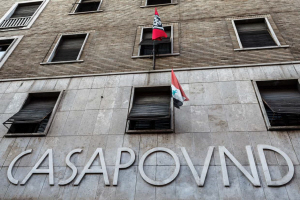Short comment on the Italian elections

Today are the parliamentary elections in Italy. Things are not looking good: according to the polls, the coalition of Silvio Berlusconi and Matteo Salvini is likely to win a majority of seats. It would not only mean Berlusconi’s return to power (although he will not be able to take up the premiership himself, as he’s been convicted of corruption). As Berlusconi has been teaming up with various extreme right parties (and has even more competition from smaller fascist parties), his election would also lead to the further criminalisation of refugees and the normalisation of racism. Berlusconi already announced that he intends to deport 600.000 people with a migrant background.
So far, Berlusconi has almost made a principle of not keeping his ‘promises’. But even if it won’t get this far, this kind of fascist discourse also poses a very immediate threat to the physical safety and wellbeing of minorities in Italy. For one, Berlusconi’s election may also contribute to the further acceptance of extreme right organisations like Casa Pound – a small and extremely violent fascist party that is unlikely to win a parliamentary seat, but which has gained significant presence in the streets of Italy during the past years.
This long article about the history of Casa Pound is an interesting read. There’s a number of important lessons that we can learn from it:
1. one of the reasons for Casa Pound’s success is that they have taken up many of the social services that were originally offered by the traditional left (the communist party, labour unions, etc.). By providing medical care, food, and even housing they’ve created a lot of goodwill among poor white Italians. Arguably, the left (in Italy and elsewhere in Europe) has too long neglected this important aspect of grassroots politics: at the end of the day, people want to see concrete changes in their own daily lives.
2. The extreme right movement in Europe is strikingly international. As the article shows, there are many close contacts between various fascist groups in France, Italy, Greece and elsewhere. Both ideologically and practically, the ties between these various movements seem to get closer and closer. This is not an Italian, but a European problem.
3. The presence of fascism in Europe is no longer a hypothetical problem, but a very real and concrete threat. Even if these relatively small parties may not be able to gain any significant electoral results, they already are successful at pulling the entire political discourse further and further to the right. Moreover, they are instrumental to nationalist and authoritarian populists like Berlusconi who are able to present their own “fascism light” as a reasonable alternative. Both sides of the extreme-right spectrum thus reinforce each other. We cannot afford to have any illusions about this: there’s no such thing as a “reasonable” nationalist alternative to fascism.
Mathijs van de Sande
